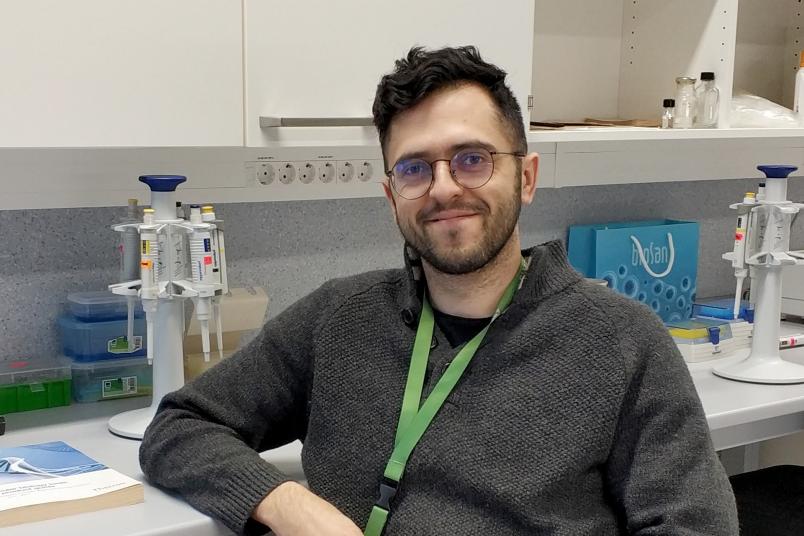
Interview
Keep those enzymes busy
“Multidisciplinary, high-tech, innovative and internationally-minded” is how a postdoc from Lithuania sees Ruhr University after a two month stay in Bochum. A joint research project exceeded all his expectations.
Together with local scientists Dr. Vytautas Petkevicius discovered an enzyme-based biocatalyst system to obtain numerous valuable products. Last year the researcher from Vilnius University, Lithuania, worked with the team of Professor Dirk Tischler at the Faculty of Biology and Biotechnology. The result of this collaboration was published in the December edition 2022 of the journal Catalysis Sciences and Technology. In the interview Vytautas reports about these findings and his stay in Bochum.
Vytautas, why did you come to Bochum?
We have been in contact with Dirk Tischler’s group on several occasions. I was fascinated by the quality and amount of scientific output by a relatively small research group. The scope of research areas was also closely related to my studies and seemed like a perfect spot to gain experience.
What is your picture of the Ruhr University Bochum?
Multidisciplinary, high-tech, innovative, and internationally-minded.
Did you enjoy staying here?
I loved it. I reckon that changing the working environment once in a while is a must for a variety of reasons. This is especially the case in the field of scientific research.

The botanical garden and trails leading to lake Kemnade were my favourite spots to spend my free time.
What did you like most?
From the scientific point of view, the ability to conduct and analyse experiments that were not feasible at that time back in our lab. With that came all the know-how, expert insights, the little details: everything that can be useful for future investigations.
But that is only a small part of the things that I enjoyed. This also includes the friendly working environment, the city itself and exploring the surroundings. The botanical garden and trails leading to lake Kemnade were my favourite spots to spend my free time.
Was there anything you didn’t like?
As a visitant, you will always ask a lot about simple, down-to-earth things: “Where is reagent A, where is reagent B and so on.” In a good way, you could say that I was annoyed about potentially being annoying to others. It was up to the patience and endurance of my colleagues, which by the way, were very kind and helpful.
What was particularly interesting?
Seeing the different aspects and solution methods when tackling a specific scientific problem. Most often they were only tiny details, certain differences in methodology, and the use of different analysis tools, but that made them only more interesting!

From a scientific point of view, results obtained from the traineeship would serve as a perfect platform for generating ideas for future experiments.
Are there any new insights you took home with you?
Oh yes, of course! I was surprised to find out that stereotypically seen as calm and serious, Germans are relaxed, funny, and humorous people – much like Lithuanians. From a scientific point of view, results obtained from the traineeship would serve as a perfect platform for generating ideas for future experiments.
Could you explain your findings from the time in Bochum?
Before my visit to Ruhr University, I was investigating a certain group of enzymes: non-heme diiron monooxygenases and their application as biocatalysts. We hypothesized that, under proper circumstances and reaction conditions, such enzymes should be able to catalyse a vast variety of potentially important chemical transformations – something that was not properly assigned to this particular enzyme group.

Strikingly, the investigative enzyme exceeded our expectations.
Professor Tischler’s lab was the right place to study such transformations as they successfully combine interdisciplinary methods from microbiology, biochemistry, and molecular biology to study enzyme catalysis. Strikingly, the investigative enzyme exceeded our expectations and catalysed some reactions that were not described previously, with a potential interest in pharmaceutical or fine chemical product synthesis. The elaboration of our findings led to this collective publication describing a unique and versatile biocatalysis system to obtain valuable products, avoiding the use of hazardous chemical methods.
Is there anything you would like to add?
Greeting to all of Research Group Microbial Biotechnology, keep those enzymes busy!
Funding